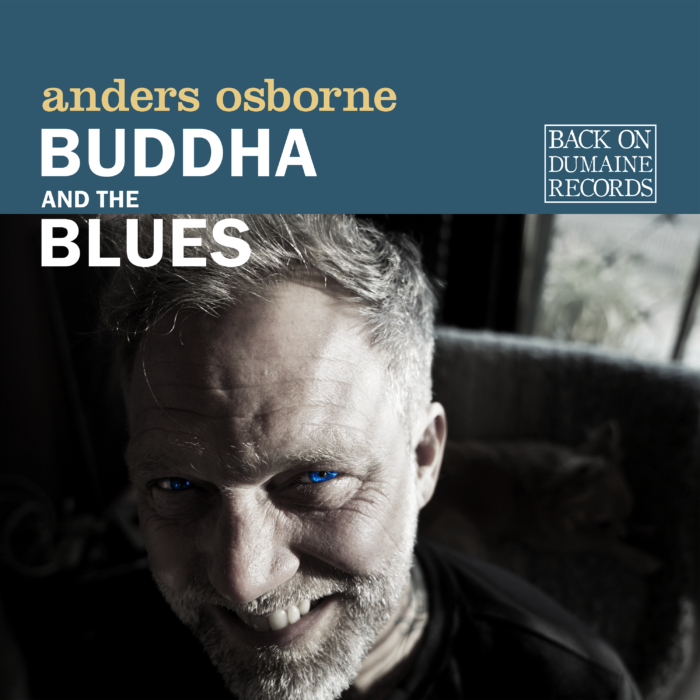When describing the title and corresponding titular track from his new album, Buddha and the Blues, singer-songwriter and guitarist Anders Osborne references the duality of existence. His own existence, one that began in Sweden and migrated to the U.S. in his teenage years, has been one of creative success, personal struggles with addiction, and a nearly uninterrupted cycle of albums and tours. Having taken up residence in New Orleans for over three decades, Osborne has become a fixture of the Crescent City’s musical community, regularly performing at Jazz Fest, both properly and in late-night appearances, including for several years ongoing with Dead Feat. Yet, Osborne’s latest recording effort takes him further back to the roots of his musical inspirations- the singer-songwriter era of Southern California in the 1970s- and to a recording studio in a small arts village of Ojai, north of Los Angeles, working with session vets such as Waddy Wachtel (Warren Zevon, Keith Richards), Benmont Tench (Tom Petty), and Bob Glaub (Jackson Browne, Bonnie Raitt), as well as producer (and drummer) Chad Cromwell (Neil Young, Mark Knopfler).
Buddha and the Blues is now streaming on Relix.com
What impact did working in Ojai, California have on the album?
I think it had a big effect. Mostly, it was a combination of things; with Bob (Glaub) and Waddy (Wachtel)- those classic West Coast sessions guys on all those records- and Chad (Cromwell), who’s amazing at stripping it down to the things that need to be played; no more, no less. The idea of cutting it out there was something I thought about for a good part of a year or two. I told Chad I’d never done a record that is trying to reflect some of my first inspirations, which was ‘70s West Coast stuff; California rock-songwriter music like Jackson Browne; and Joni (Mitchell); James Taylor. All that stuff that came out of there. It was time to connect the dots.
Was it also the right time to make a record away from New Orleans?
Since I got sober, a lot of stuff has been about confession. My thought process has changed. I don’t think as much about that. Also, the importance of New Orleans feels second nature to me after 35 years. It isn’t as crucial for me to be here to do what I do. When we got out there, to that dry Southern California hill country- the rolling, beautiful beige and yellow and orange; dried out green; blue sky. It is different. I wrote with that in mind. It was wonderful.
You have spoken of duality when describing the title song. I inferred several instances of other dualities throughout the album. One example is a frailty that is suggested at times, and how acknowledging it becomes a source of strength.
You’re spot-on. That’s exactly what it is. It’s interesting to hear the reaction. My thought was that it is a strong album; that I was confident and strong. But, your reaction of frailty, and more intimacy, has come from a few people very close to me as well. I think the discovery has been that this part of me is something I feel strong about; that I feel full strength from being that person; admitting it and being okay with it.
I can hear, again a duality, an assuredness that emerges from uncertainty. Like, even when things aren’t okay, they are okay.
There were some quotes floating around as we prepared to spread the word about the record. One is, there is a sense of a battle between ‘I don’t care anymore,’ about my career, and ‘I give up,’ about my career. There is a sense that I’ve reached my final destination within myself, and I have just begun my true journey. That duality has been really up front for a year now. Maybe two. My internal discussion, constantly, even musically, has a lot less to prove, a lot less to show people. Or I’m trying to connect to myself and other people; almost like a diary, lately. I want it to be honest and I want it to be beautiful.
Does that account for a lot of the album being written in first person? Are you using that but inhabiting a character or is this truly autobiographical?
I’d say the latter. What I debate as I write is playing with third person- talking to someone- like on “Escape,” there was a mistake we left on. I start out (singing) something like, ‘You shouldn’t go too far into your mind. You’ll get lost.’ It was supposed to stay that way, but in the pre-chorus, I accidently sing ‘I’ve seen what I’ve seen. I’ve been where I’ve been.’ I slipped, and it became first person again. As a craftsman, I wanted to fix it, but Chad said it was good; to keep it. Sometimes I like to yell at someone, even if it is to myself, and I’ll use third person. And sometimes you just want to confess to people. You find whatever voice works to feel good singing it.



No Comments comments associated with this post